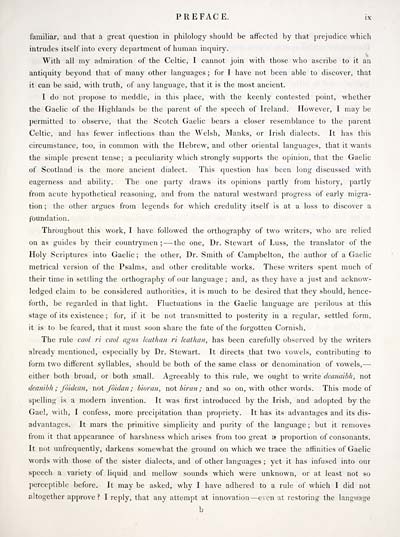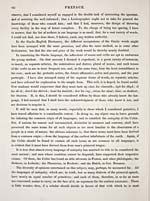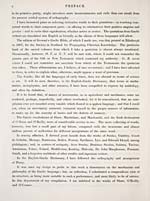Download files
Complete book:
Individual page:
Thumbnail gallery: Grid view | List view

PREFACE. ix
familiar, and that a great question in philology should be affected by that prciudice which
intrudes itself into every department of human inquiry.
With all my admiration of the Celtic, I cannot join with those who ascribe to it an
antiquity beyond that of many other languages ; for I have not been able to discover, that
it can be said, with truth, of any language, that it is the most ancient.
I do not propose to meddle, in this place, with the keenly contested point, whether
the Gaelic of the Highlands be the parent of the speech of Ireland. However, I may be
permitted to observe, that the Scotch Gaelic bears a closer resemblance to the parent
Celtic, and has fewer inflections than the Welsh, Manks, or Irish dialects. It has this
circumstance, too, in common with the Hebrew, and other oriental languages, that it wants
the simple present tense; a peculiarity which strongly supports the opinion, that the Gaelic
of Scotland is the more ancient dialect. This question has been long discussed with
eagerness and ability. The one party draws its opinions partly from history, partly
from acute hypothetical reasoning, and from the natural westward progress of early migra-
tion ; the other argues from legends for which credulity itself is at a loss to discover a
foundation.
Throughout this work, I have followed the orthography of two writers, who are relied
on as guides by their countrymen ; — the one. Dr. Stewart of Luss, the translator of the
Holy Scriptures into Gaelic ; the other, Dr. Smith of Campbelton, the author of a Gaelic
metrical version of the Psalms, and other creditable works. These writers spent much of
their time in settling the orthography of our language; and, as they have a just and acknow-
ledged claim to be considered authorities, it is much to be desired that they should, hence-
forth, be regarded in that light. Fluctuations in the Gaelic language are perilous at this
stage of its existence ; for, if it be not transmitted to posterity in a regular, settled form,
it is to be feared, that it must soon share the fate of the forgotten Cornish.
The rule caol 7-i caol agiis kuthan ri leathan, has been carefully observed by the writers
already mentioned, especially by Dr. Stewart. It directs that two vowels, contributing to
form two different syllables, should be both of the same class or denomination of vowels, —
either both broad, or both small. Agreeably to this rule, we ought to write deanaibh, not
deanibh ; fòkkan, not fòidan ; bioran, not biran; and so on, with other words. This mode of
spelling is a modern invention. It was first introduced by the Irish, and adopted by the
Gael, with, I confess, more precipitation than propriety. It has its advantages and its dis-
advantages. It mars the primitive simplicity and purity of the language ; but it removes
from it that appearance of harshness which arises from too great a proportion of consonants.
It not unfrequently, darkens somewhat the ground on which we trace the affinities of Gaelic
words with those of the sister dialects, and of other languages ; yet it has infused into our
speech a variety of liquid and mellow sounds which were unknown, or at least not so
perceptible before. It may be asked, why I have adhered to a rule of which I did not
altogether approve ? I reply, that any attempt at innovation — even at restoring the language
b
familiar, and that a great question in philology should be affected by that prciudice which
intrudes itself into every department of human inquiry.
With all my admiration of the Celtic, I cannot join with those who ascribe to it an
antiquity beyond that of many other languages ; for I have not been able to discover, that
it can be said, with truth, of any language, that it is the most ancient.
I do not propose to meddle, in this place, with the keenly contested point, whether
the Gaelic of the Highlands be the parent of the speech of Ireland. However, I may be
permitted to observe, that the Scotch Gaelic bears a closer resemblance to the parent
Celtic, and has fewer inflections than the Welsh, Manks, or Irish dialects. It has this
circumstance, too, in common with the Hebrew, and other oriental languages, that it wants
the simple present tense; a peculiarity which strongly supports the opinion, that the Gaelic
of Scotland is the more ancient dialect. This question has been long discussed with
eagerness and ability. The one party draws its opinions partly from history, partly
from acute hypothetical reasoning, and from the natural westward progress of early migra-
tion ; the other argues from legends for which credulity itself is at a loss to discover a
foundation.
Throughout this work, I have followed the orthography of two writers, who are relied
on as guides by their countrymen ; — the one. Dr. Stewart of Luss, the translator of the
Holy Scriptures into Gaelic ; the other, Dr. Smith of Campbelton, the author of a Gaelic
metrical version of the Psalms, and other creditable works. These writers spent much of
their time in settling the orthography of our language; and, as they have a just and acknow-
ledged claim to be considered authorities, it is much to be desired that they should, hence-
forth, be regarded in that light. Fluctuations in the Gaelic language are perilous at this
stage of its existence ; for, if it be not transmitted to posterity in a regular, settled form,
it is to be feared, that it must soon share the fate of the forgotten Cornish.
The rule caol 7-i caol agiis kuthan ri leathan, has been carefully observed by the writers
already mentioned, especially by Dr. Stewart. It directs that two vowels, contributing to
form two different syllables, should be both of the same class or denomination of vowels, —
either both broad, or both small. Agreeably to this rule, we ought to write deanaibh, not
deanibh ; fòkkan, not fòidan ; bioran, not biran; and so on, with other words. This mode of
spelling is a modern invention. It was first introduced by the Irish, and adopted by the
Gael, with, I confess, more precipitation than propriety. It has its advantages and its dis-
advantages. It mars the primitive simplicity and purity of the language ; but it removes
from it that appearance of harshness which arises from too great a proportion of consonants.
It not unfrequently, darkens somewhat the ground on which we trace the affinities of Gaelic
words with those of the sister dialects, and of other languages ; yet it has infused into our
speech a variety of liquid and mellow sounds which were unknown, or at least not so
perceptible before. It may be asked, why I have adhered to a rule of which I did not
altogether approve ? I reply, that any attempt at innovation — even at restoring the language
b
Set display mode to: Large image | Transcription
Images and transcriptions on this page, including medium image downloads, may be used under the Creative Commons Attribution 4.0 International Licence unless otherwise stated. ![]()
| Early Gaelic Book Collections > Blair Collection > Gaelic dictionary, in two parts > (15) |
|---|
| Permanent URL | https://digital.nls.uk/79284329 |
|---|
| Description | A selection of books from a collection of more than 500 titles, mostly on religious and literary topics. Also includes some material dealing with other Celtic languages and societies. Collection created towards the end of the 19th century by Lady Evelyn Stewart Murray. |
|---|
| Description | Selected items from five 'Special and Named Printed Collections'. Includes books in Gaelic and other Celtic languages, works about the Gaels, their languages, literature, culture and history. |
|---|

